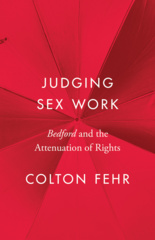
Privacy in Peril
Hunter v Southam and the Drift from Reasonable Search Protections
In 1984, the Supreme Court of Canada, in Hunter v Southam, declared warrantless searches unreasonable under section 8 of the Charter of Rights and Freedoms. Police would henceforth require authorization based on “reasonable and probable grounds.” The decision promised to protect individuals from encroaching state power, but as Richard Jochelson and David Ireland argue, post-Hunter search and seizure law took a turn away from the landmark decision. A close examination of dozens of post-Hunter cases reveals that section 8 protections have become more difficult to obtain in the post-9/11 era. Rather than developing rigorous standards for new search and surveillance techniques and technologies, the court has used the Charter to sanction broader police powers. Yet, even as it demonstrates that the core principles of Justice Dickson’s vision for section 8 rights have been diminished in an era of heightened security and expanding police powers, Privacy in Peril suggests that increasing citation of Hunter in the halls of justice offers hope that some protection of civil liberties will endure in the twenty-first century.
This book is an invaluable resource for anyone thinking about search and seizure, whether they are students or legal scholars; members of policing organizations, security forces, or civil liberties groups; or individuals concerned about the overreach of state power.
…it provides a thoughtful, critical counterpoint to those more practical texts. Academic and judicial libraries as well as prosecution departments and criminal law firms will find it to be a useful addition to their collections.
Cogently argued and exhaustively researched, this book is an indispensable resource for anyone interested in the law of search and seizure in Canada.
With remarkable clarity and insight this book tells us the story of one of the most important cases decided under Canada’s Charter of Rights and Freedoms – the Supreme Court’s 1984 decision in Hunter v Southam – and why that decision remains so relevant today.
Privacy in Peril is rigorous, comprehensive, and engaging.
Richard Jochelson teaches in the Faculty of Law at the University of Manitoba and is the author of several books on police powers and sexual regulation. After articling at the Alberta Court of Appeal and Court of Queen’s Bench, he worked at one of Canada’s largest law firms. David Ireland teaches criminal law and evidence at the Faculty of Law at the University of Manitoba and is the director of the Robson Hall Innocence Clinic. He was called to the Manitoba bar in 2011 and has practised criminal law as both defence counsel and a prosecutor.
Introduction
1 Dickson’s Decision: The Supreme Court as Guardian of the Constitution
2 The Threshold Test: A Reasonable Expectation of Privacy
3 Lowering the Bar: The Supreme Court’s Failure to Maintain the Hunter Standard
4 Expanding Search Powers: Search Incident to Arrest and Exigent Circumstances
Conclusion
Appendix: A Note on the Evidence
Notes; Bibliography; Index of Cases; Index


















